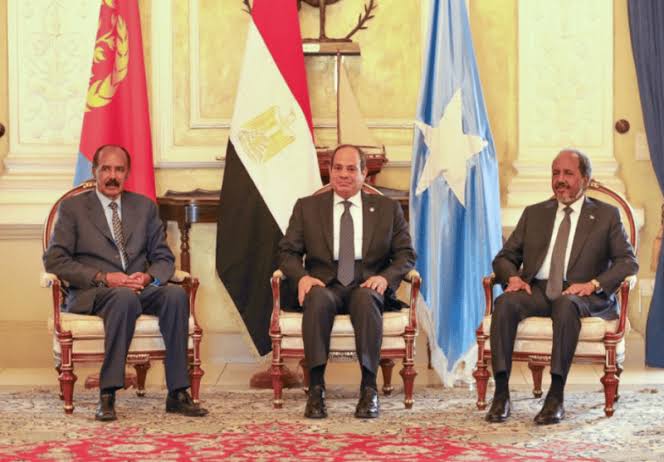Facebook Twitter (X) Instagram Somali Magazine - People's Magazine
The first regular tripartite meeting of the Foreign Ministers of Eritrea, Egypt, and Somalia took place in Cairo, marking a significant step in strengthening regional cooperation and promoting peace in the Horn of Africa. The high-level diplomatic engagement followed the Tripartite Summit held in Asmara on October 10, 2024, where President Isaias Afwerki of Eritrea, President Abdel Fattah El-Sisi of Egypt, and President Hassan Sheikh Mahmoud of Somalia agreed to establish regular ministerial meetings to enhance collaboration.
During the Cairo meeting, Eritrea’s Foreign Minister Osman Saleh, Egypt’s Foreign Minister Dr. Badr Abdelatty, and Somalia’s Foreign Minister Ahmed Moalim Fiqi engaged in discussions focused on deepening ties and ensuring security in the Horn of Africa. The ministers explored avenues for regional cooperation, emphasizing conflict resolution, stability, and mutual economic growth across their nations.
A central theme of the discussions was the importance of collective efforts to address the ongoing security challenges in the Horn of Africa. The region has long faced instability due to conflicts, terrorism, and maritime security threats. The ministers highlighted the need for a coordinated approach to tackle these issues, emphasizing intelligence sharing, diplomatic engagement, and mutual support for counterterrorism efforts.
Eritrean Foreign Minister Osman Saleh also held a bilateral meeting with his Egyptian counterpart Dr. Badr Abdelatty to discuss economic cooperation between their nations. Both ministers underscored the need to bolster trade relations, improve cross-border investments, and enhance infrastructure development. Egypt, a key regional economic player, expressed interest in supporting Eritrea’s economic diversification efforts, particularly in sectors like agriculture, energy, and transport.
The discussions also reflected growing interest in collaborative economic strategies aimed at reducing dependency on external powers and fostering African-driven development. This aligns with the broader objectives of the African Union’s Agenda 2063, which prioritizes regional integration, self-reliance, and sustainable growth across the continent.
Somalia’s Foreign Minister Ahmed Moalim Fiqi contributed insights on the importance of strengthening regional partnerships to address shared challenges such as piracy, food insecurity, and political instability. Somalia’s ongoing efforts to stabilize its governance structures were also discussed, with the foreign ministers emphasizing support for state-building initiatives that empower Somali institutions and ensure long-term stability.
The Tripartite Summit in Asmara had previously set the stage for this diplomatic cooperation, focusing on long-term stability, security coordination, and economic collaboration. The Cairo meeting marked the formalization of those commitments, with the ministers agreeing to hold regular sessions to monitor progress and adjust strategies as needed.
The significance of this trilateral cooperation extends beyond immediate security concerns. The Horn of Africa is a strategically vital region, controlling access to the Red Sea and serving as a gateway for global maritime trade. By fostering stronger ties, Eritrea, Egypt, and Somalia aim to create a more secure and prosperous environment, not only for their citizens but for the broader African continent.
Egypt’s involvement in these talks also reflects its growing diplomatic influence in the region. As a historical power in North Africa and the Nile Basin, Egypt continues to play a pivotal role in regional mediation and peace efforts. President Abdel Fattah El-Sisi has consistently advocated for greater African unity, emphasizing collaboration on issues such as water security, energy cooperation, and counterterrorism.
The Cairo meeting concluded with a reaffirmation of the three nations’ commitment to ongoing diplomatic dialogue and regional cooperation. The ministers agreed to establish working groups focused on specific areas such as trade, security, and humanitarian assistance, ensuring that the commitments made during the meeting translate into actionable policies.
This tripartite cooperation represents a positive step toward building stronger diplomatic bridges in the Horn of Africa, a region historically marred by conflict and fragmentation. If successful, this alliance could serve as a model for other African regions seeking to resolve disputes and promote development through multilateral collaboration.

